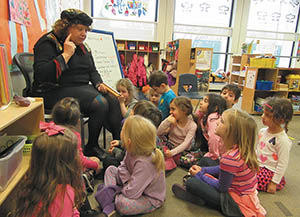

This year, in the Early Childhood department, Yeshivat Noam introduced a new program to foster important social-emotional and student skills in the children. These skills are as essential as the academic skills that the children learn throughout their years at Yeshivat Noam. As Director of Early Childhood Support Services, I developed the MySELF program for our Buds and kindergarten classes. This program is based on the theories of Social-Emotional Learning (SEL) and the MindUp curriculum (a collaboration of the Hawn Foundation and Scholastic), as well as on current research in the fields of developmental cognitive neuroscience, mindfulness training and positive psychology.
At a national conference in Atlanta for early childhood specialists on October 7-9, I had the opportunity to hear the latest research about SEL programs for young children and to discuss the importance and success of such programs with colleagues from across the country. MySELF, “My Social-Emotional Learning and Friends,” helps children learn about themselves—“how I think, how I feel, how I act”—and about how to be a friend.
Each week, I visit every Buds (pre-K) and kindergarten class and lead a group activity, which fosters skills in the areas of focus, self-control and self-regulation; listening and communicating; conflict resolution; social skills such as empathy, patience, and perspective taking; resiliency and decision making; and enthusiasm for and love of learning.
In order for parents to learn how to support and reinforce these new skills at home, explanations and practical suggestions are sent home throughout the year. This is an overview of the “Mindful Listening and Breathing” unit presented, along with suggestions that parents can do at home to follow up and practice these skills: The children have learned how to listen closely to a resonant sound until the sound fades, and then take deep breaths from their “tummies.” After listening and breathing, the children will say “I feel calm”; “I feel like I’m in my bed before I fall asleep,” “I feel happy”—we begin and end with this exercise. Try this at home, you can ask your children to “listen” just like they do at school. Signal it with a resonant sound (e.g., striking a piano key, Zynergy chime). Ask them to show you how they can calm down their bodies, and brains, when they listen and breathe. A fun game that we played was the Mystery Sound Bag. The children had to listen very carefully in order to guess the sounds. Even when there is background noise, “our brains can tell our ears” to listen carefully and mindfully.
By Amy Kagedan, Director of Early Childhood Support Services at Yeshivat Noam









